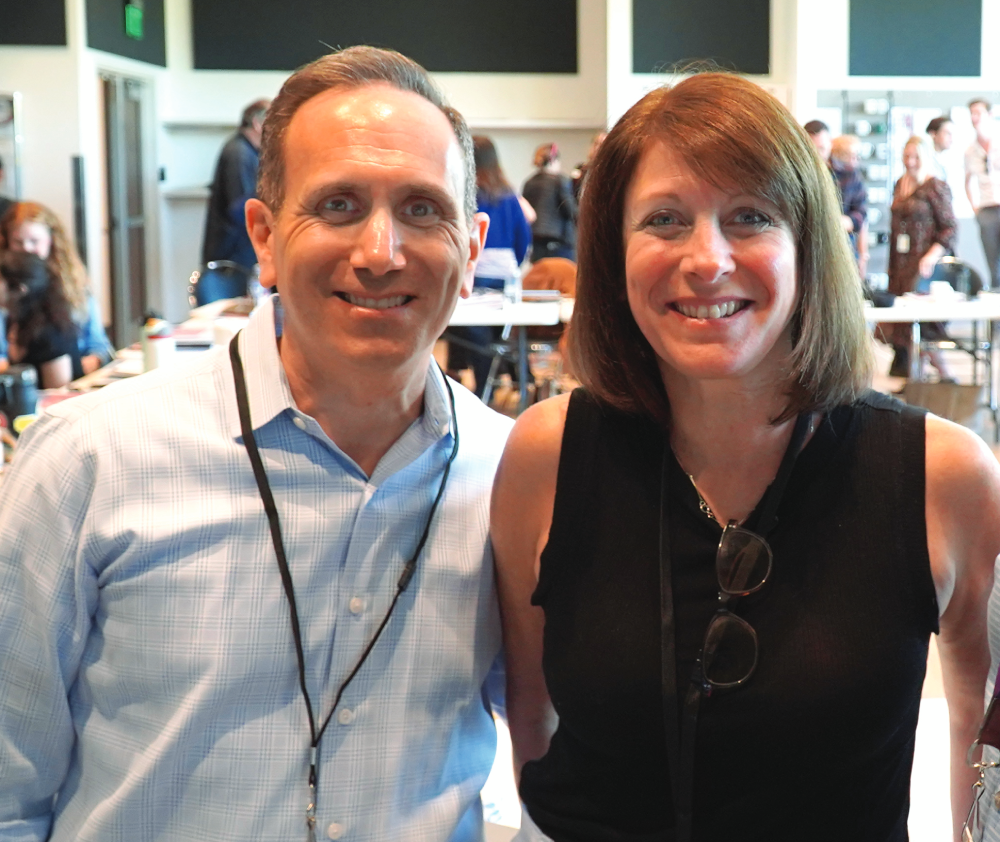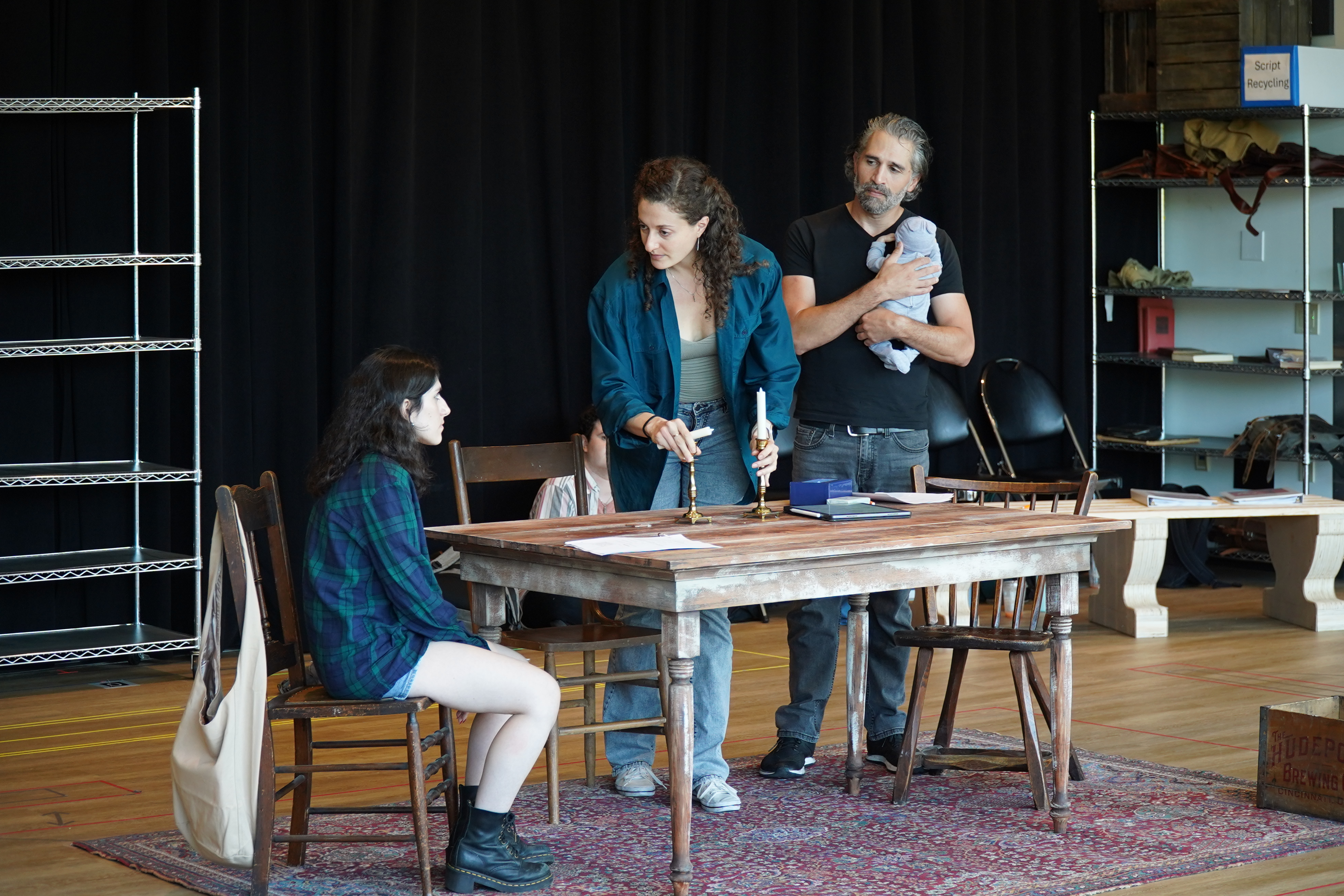ORIGINS OF A NEW MUSICAL

Rutka, a new musical, is about to make its debut here at the Cincinnati Playhouse in the Park, promising an unforgettable story of resistance. The producers, Amy Langer and David Schwartz, talked with us about the creative process behind the show. From the inception of the idea to opening night, they shared insights into the challenges, triumphs and passion that went into bringing this production to life.
How did you first learn about Rutka's story?
In 2016, with anti-Semitism, hatred and division on the rise, especially noticeable in the schools, we started looking into the stories of young diarists from the Holocaust, outspoken young women, who could be role models for the youth of today. We really only knew about Anne Frank’s story. When we discovered Rutka’s Notebook and noticed that it was just discovered and published in 2006, we were curious to read it. Once we did, we were struck by how her words captured the completely relatable experiences of every teenager, then or now, even in the face of unimaginable existential threats.
Where did the idea come from to dramatize this diary as a musical?
A big part of it was how deep and engaging Rutka’s writing was, despite her young age. It really leapt off the page at us. They say that, in a musical, people sing when the emotions are too big for words alone, and Rutka’s writing definitely felt that way. Even on the page, it felt like it sang. Beyond that, the need to dramatize it really came from a desire to explore empathy, understanding, and to use art as a means to help fight hatred and discrimination. We believe music has a unique power to connect with people on a deep level. We wanted to make this story resonate with new audiences in a way that felt relevant to them.
Initially, her writing felt almost like punk rock to us, but we quickly realized that wasn’t the right sound. After spending three days going down a Spotify rabbit hole, we discovered the band Pearl and the Beard. As soon as we heard them, we knew that their unique and exciting sound captured exactly what we were looking for. The challenge was that the band had already broken up. Thankfully, we were able to find their emails, so we reached out to the band members and asked them to meet with us. They agreed, as long as it was in a very public place — just in case we were actually crazed fans. When they met with us, it was actually the first time they had been in a room together in two years, since the break-up. That meeting led to an incredible conversation, and the band's two founding members – Jeremy Lloyd-Styles and Jocelyn Mackenzie — decided to take the leap with us, bringing their incredible fusion of indie rock, pop and folk sound to this project. The music that they’ve created here — inspired by Rutka’s words and emotions — is absolutely transcendent.

Lana Schwartz (Rutka), Bex Odorisio (Dvorah) and Ben Cherry (Yaacov) in rehearsal
What was the process to create a script and score based on Rutka Laskier's diary entries?
The first step was to secure the rights from Rutka’s half-sister, Dr. Zahava Scherz, who lives in Tel Aviv. We were definitely nervous about what Zahava would think of our idea — a musical with an indie-rock score about her sister.
When she came to New York, we explained our vision, and to our relief and excitement, she was absolutely thrilled. She loved the idea of bringing Rutka’s story to life in a way that could connect with today’s audiences and future generations. Once we had Zahava’s blessing, we brought on Jocelyn and Jeremy to start writing songs inspired by the diary’s most powerful moments. Because Rutka’s diary is only 60 pages long, we knew we had to read between the lines in order to expand on the story.
This involved a lot of research — talking with Holocaust survivors, digging into the history of Bedzin (the town where Rutka lived), studying up on everything that was known about Rutka, and fleshing out the details of Rutka’s life. This included themes of teens clinging to normalcy, first love, resistance, resilience and, importantly, hope that they could still make a difference and an impact on the world. We hired a book writer and dramaturg to help us adapt it into a full musical. Neena Beber, who is currently writing the script, has done a brilliant job at adapting it all.
One of the really interesting parts of the story involves a young Polish girl named Stanislawa who had to leave her home when the Ghetto was created. The Germans had moved all of the non-Jews out, including Stanislawa’s family, in order to push all the Jews into that one area. Rutka’s family was moved in, and, as Stanislawa came back often to check on her old home, the two girls became close friends. Before Rutka was deported to Auschwitz, she told Stanislawa where she had hidden her diary, asking her to retrieve it and protect it after she was gone. Stanislawa did just that and kept the diary safe for 63 years, before finally revealing it to the world. We actually got to meet Stanislawa on Zoom on her hundredth birthday, learning more personal details about Rutka’s story from her, which was incredibly moving and added so much depth to the writing process.
 Julia Ty Goldberg (Nina), Zoe Siegel (Micka), Lana Schwartz (Rutka) and Sabrina Coss (Linka) in rehearsal
Julia Ty Goldberg (Nina), Zoe Siegel (Micka), Lana Schwartz (Rutka) and Sabrina Coss (Linka) in rehearsal
How did you find your way to working with the Cincinnati Playhouse in the Park?
We had been looking at and talking with a number of theatres, but the Playhouse was one that really stood out to us. It had all of the qualities we were looking for: a tremendous community that truly supports the arts, a Broadway-sized stage, a perfectly-sized house, and the new space is absolutely gorgeous. Plus, having a smart and collaborative Artistic Director was a key consideration for us, and our director, the incredibly accomplished Wendy C. Goldberg, absolutely raved about Blake and the Playhouse team. Perhaps most importantly, we wanted to be somewhere that was excited about Rutka, and that would share our passion for the show. From our very first conversation with Blake and the team, their passion for the project, their desire to bring this bold, innovative and moving piece to their audiences, was palpable, and from that moment on, we knew that the Cincinnati Playhouse was the absolute right home for this all-important step on Rutka’s journey.